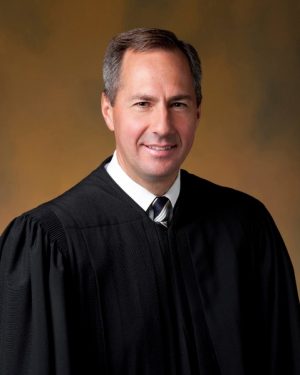An Outspoken Critic Of A Supreme Court Shortlister
A "celebrity" in legal circles comes out against one of the SCOTUS finalists.

Judge Thomas Hardiman (3d Cir.)
Judge Thomas Hardiman of the Third Circuit, one of the three or four judges that President Donald Trump is considering for the Supreme Court seat once held by Justice Antonin Scalia, enjoys an excellent reputation. My last job as a lawyer involved arguing appeals before the Third Circuit, and although I never argued before Judge Hardiman, I know a number of lawyers who have appeared before him. They describe him as smart, well prepared, and cordial to colleagues and litigants — just the type of jurist that one would want to see on SCOTUS.
But admiration for Judge Hardiman is not quite universal. We recently heard from Anthony Elonis, whose name might ring a bell for many lawyers, especially those whose practice involves the First Amendment, social media, or appellate advocacy. He’s something of a “celebrity” in legal circles as the petitioner in Elonis v. United States, in which he successfully argued to SCOTUS that his conviction for threatening another person over interstate lines could not stand.

The Business Case For AI At Your Law Firm

The facts of the case were colorful. Elonis, using the pseudonym “Tone Dougie,” went on Facebook and posted a slew of “crude, degrading, and violent” statements about various people in his life — which these individuals, including his now ex-wife and former co-workers, viewed as threats, but which Elonis passed off as rap lyrics and “art.” Elonis was viewed as a potentially important precedent about the applicability of the First Amendment to social media (although the case wound up getting decided on statutory rather than constitutional grounds — and, on remand, the Third Circuit affirmed Elonis’s conviction on harmless error grounds).
Anyway, Elonis is not a fan of Judge Hardiman. Here’s what he wrote to us yesterday:
Judge Hardiman sat on the panel that refused to follow the U.S. Supreme Court’s directive on remand that my “conviction cannot stand,” instead finding that the failure of the district court to instruct the jury on “the crucial element separating legal innocence from wrongful conduct” was harmless error. [Ed. note: I don’t see anything in Chief Justice Roberts’s opinion for the Court precluding the Third Circuit from finding harmless error on remand — and Justice Alito, writing separately, explicitly endorsed this option.]
As a member of the panel in Elonis v. United States, both before and after remand, Judge Hardiman is simply unqualified to be a member of the Supreme Court of the United States.
Judge Hardiman has no respect for the importance of mens rea in criminal jurisprudence, no respect for the constitutional role of the jury, and, lastly, no respect for the very institution he is being considered to join.
I find it troubling that The Heritage Foundation and the Federalist Society would support his nomination given that both organizations are proponents of mens rea reform and opposed to Federal overcriminalization.
Then again, maybe it’s just me.
It might just be you, Anthony Elonis. It’s not clear how much weight President Donald Trump will give to the views of a convicted felon whose claim to fame arises from threatening his wife online.
Sponsored

Navigating Financial Success by Avoiding Common Pitfalls and Maximizing Firm Performance

The Business Case For AI At Your Law Firm


Legal AI: 3 Steps Law Firms Should Take Now

Is The Future Of Law Distributed? Lessons From The Tech Adoption Curve
But then again, if there ever was a presidential administration willing to listen to a loudmouth known for disrespecting women, it might just be this one.
Earlier: Supreme Court Update: And Then There Were Three Four
 David Lat is the founder and managing editor of Above the Law and the author of Supreme Ambitions: A Novel. He previously worked as a federal prosecutor in Newark, New Jersey; a litigation associate at Wachtell, Lipton, Rosen & Katz; and a law clerk to Judge Diarmuid F. O’Scannlain of the U.S. Court of Appeals for the Ninth Circuit. You can connect with David on Twitter (@DavidLat), LinkedIn, and Facebook, and you can reach him by email at dlat@abovethelaw.com.
David Lat is the founder and managing editor of Above the Law and the author of Supreme Ambitions: A Novel. He previously worked as a federal prosecutor in Newark, New Jersey; a litigation associate at Wachtell, Lipton, Rosen & Katz; and a law clerk to Judge Diarmuid F. O’Scannlain of the U.S. Court of Appeals for the Ninth Circuit. You can connect with David on Twitter (@DavidLat), LinkedIn, and Facebook, and you can reach him by email at dlat@abovethelaw.com.
Sponsored

Early Adopters Of Legal AI Gaining Competitive Edge In Marketplace








